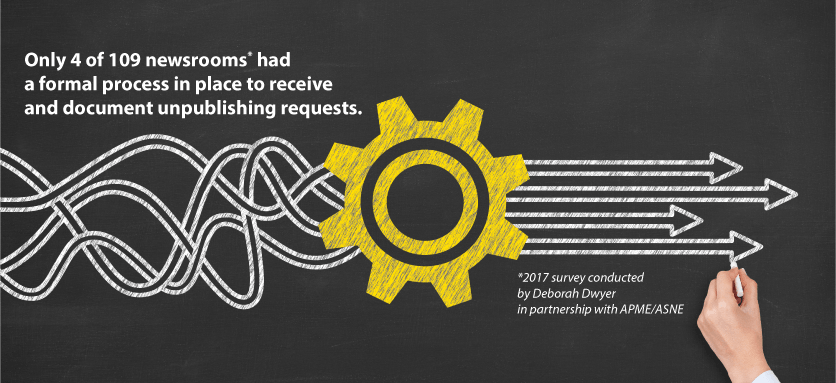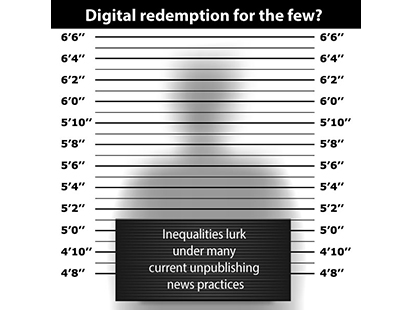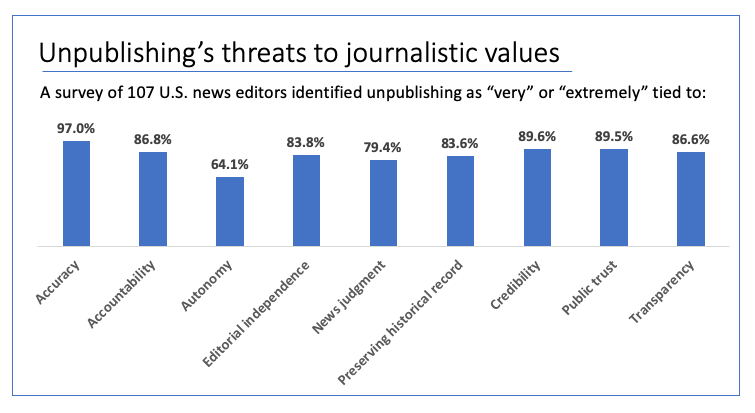
Tag: unpublishing
New initiative aims to help journalists address the ‘unpublishing’ dilemma
Unpublishingthenews.com debuts with policy repository, newsroom resources and new research about the public’s expectations of American newsrooms that unpublish.
Unpublishing challenges demand cohesion between pre- and post-publication policies
Newsroom project shows newsmaking and “news breaking” policies go hand-in-hand I met with several editorial leaders of the Columbia Missourian and KOMU-TV recently about our project to develop pre-publication policies that are crafted in consideration of the longtail of publishing. I’ve written about the importance of critically analyzing reporting practices in a previous article. Our … Continued
Taking a look at the Boston Globe’s “Fresh Start” program
Here are some key elements to consider Last week, the Boston Globe announced a new program to help reduce the impact of personal information found online. The Fresh Start initiative invites people to request a review of information about them in the news site’s public-facing archive, similar to some other efforts we’ve seen launched in … Continued
A streamlined unpublishing process is as important as thoughtful policy
An official request process and tracking form are vital — and we want to build you one.If I asked you to give me the basics of your last five unpublishing requests, could you do it? What about the last 10? Twenty? Fifty? Do you have any history about the requests that were received by the … Continued
When should you think about unpublishing? Before you publish in the first place.
It may be time to revisit basic editorial practices in your newsroom.
‘Unpublishing’ may be a catchy term, but does it accurately encompass the issue?
Most journalists would agree that the words we use to identify important issues are intrinsic to understanding them. New phenomena get labeled through the process of discovery by individuals who, naturally, do not yet fully understand them. I propose we may need a better term for what we currently refer to as unpublishing. The Unpublishing … Continued
Unpublishing project advisory board gets rolling
The unpublishing project has gained significant momentum in the last few weeks, including an unpublishing webinar with editors RJI hosted in August. Much of the work has been behind the scenes, cementing the foundation I need to ensure the final result is valuable to newsrooms across the country. There is much work to be done in … Continued
Good intentions for unpublishing may create unintended inequities
If you are working in a newsroom, you probably already know the challenges surrounding low-level crime reporting today. Crime briefs and the publication of mugshots drive a substantial number of unpublishing requests by individuals looking to shield these digital reminders of their past, often about old arrests or convictions. This has caused at least one … Continued
Facing the pressure to unpublish
This project represents my commitment to helping the industry solve a problem that editors say is rising in importance: how to respond to requests by members of the public to “unpublish”—typically meaning deleting or significantly altering—online news content that identifies them in a way that they would rather forget. Often, but not always, the request … Continued
RJI Fellowship to help newsrooms handle unpublishing requests ethically and practically
Fellow pursued doctorate in pledge to help news organizations, including one she once worked for, tackle issues related to unpublishing









